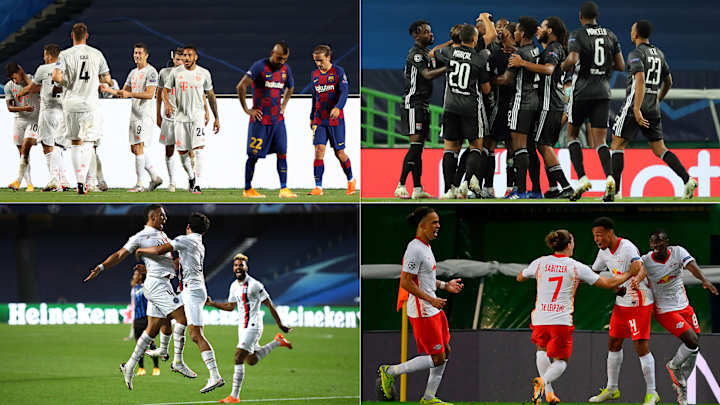The Champions League Semifinals' Themes and Common Thread

The era of Spanish technical ability is over. Welcome to the age of German pressing. The Champions League semifinals in Portugal may pit two German sides against two French sides, but a year after German manager Jurgen Klopp led Liverpool to the European crown, three of the clubs in the last four are led by German managers with a similar philosophy, while the exception, Lyon’s Rudi Garcia, is a coach who has historically favored something similar, even if he has been forced recently to adapt to circumstance.
Tuesday’s semifinal between PSG and RB Leipzig is a clash of two of the new wave of German coaches, but it is also a meeting of new money and even newer money. This, it increasingly feels, is the reality of modern football: a club founded in 1970 and taken over by the Qatari state in 2011, against one founded in 2009 and run as the centerpiece of a global network of clubs by the energy drinks company Red Bull.
Their approaches have been very different, though. PSG has spent lavishly and had great success domestically, only to falter in major European games–this is its first Champions League semifinal since 1994-95–repeatedly undone by an unbalanced squad that habitually seemed startled to come up against opponents who were able to challenge it. Leipzig, meanwhile, has focused on the development of young players operating to a common philosophy. Had it not been for the way it has breached the spirit–though not the letter–of Germany’s ownership regulations, it might even be popular.
That was why the appointment of Thomas Tuchel at PSG in 2018 was so significant. After managers whose instincts were to appease the big names, he has a reputation for prickliness and, both at Mainz and Dortmund, has pursued a team-based style rooted in the hard press. PSG has been notably better balanced in the Champions League this season, and it impressed against Real Madrid in the group stage. Neymar’s performance against Atalanta was one of the most mature he has given in a big game. Despite the two missed gilt-edged chances in the first half, he persevered, occasionally dropping too deep and trying to do too much, it’s true, but never succumbing to the petulance that has so characterized him in difficult games over the years.
Two things, though, may count against PSG. Firstly, that the quality of the rest of the French league means it is not used to being challenged. It was rattled by Atalanta’s pressing in the quarterfinal, certainly in the first half, and Leipzig, having had a longer break since the end of its season, is unlikely to tire as the Italian side did. Secondly, which is not unrelated, PSG has developed a habit of choking on the big European occasion.
PSG has also lost Edinson Cavani and Thomas Meunier, both of them departed thanks to the bizarre regulation that has allowed players to leave for new clubs or for their contracts to expire in line with their original terms while the season is ongoing. If Kylian Mbappe, who managed a decisive half hour against Atalanta despite a quick return from an ankle injury, is fit to play a fuller part, that may not be too disruptive and, certainly, the net loss for PSG is less than that for Leipzig, which has seen its leading scorer, Timo Werner, already leave for Chelsea. Julian Nagelsmann is very much in the same tradition as Tuchel and demonstrated his tactical versatility against Atletico Madrid in the quarterfinals. In three meetings with Tuchel–whom he famously played for with Augsburg's reserve team–Nagelsmann is yet to win, though that all came as Hoffenheim manager against Tuchel's Dortmund.
Bayern Munich's Hansi Flick is almost a decade older than Tuchel, who is himself more than a decade older than Nagelsmann, but having bided his time as an assistant coach, he still feels fresh. Bayern, chasing a treble to repeat its feat of 2013, has won 27 of its last 28 games, and in demolishing Barcelona it demonstrated just how devastating it can be going forward. There were, though, occasional worrying signs at the back that Barcelona was able to exploit before the match got away, and that may give Lyon some encouragement in their Wednesday matchup. It's a rematch of the 2010 semifinal that represented Lyon's last appearance this deep into the competition.
In eliminating Juventus and Manchester City, Garcia’s side showed it is capable of a collective defensive effort while breaking forward dangerously through Memphis Depay, Karl Toko Ekambi and Maxwel Cornet. Houssem Aouar, meanwhile, has excelled in midfield, with the 22-year-old drawing plaudits from both Pep Guardiola and Kevin De Bruyne after the quarterfinal.
Money, which is what tends ultimately to dictate football these days, would suggest the final will be Bayern against PSG, a clash of two superclubs. Both Nagelsmann and Garcia, though, have the wit to pull off a shock. Regardless of who wins, this has been a season that has confirmed a trend that has been rising for two or three years now. A Spanish game rooted in technicality has been surpassed by a German game that presses in much the same way, but with far greater physicality.
MORE OF SPORTS ILLUSTRATED'S CHAMPIONS LEAGUE COVERAGE
Julian Nagelsmann's magic touch for RB Leipzig vs. Atletico Madrid
Tyler Adams etches his name in USMNT abroad lore
PSG sheds its baggage with a late comeback vs. Atalanta
Manchester City's maddening Champions League pattern continues
Bayern Munich dismantles Barcelona in an 8-2 thrashing for the ages

An accomplished author of multiple books, Jonathan Wilson is one of the world’s preeminent minds on soccer tactics and history.